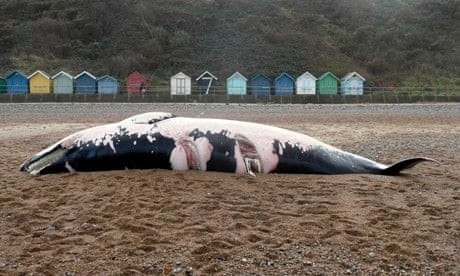The two whales that washed up dead on the coast of Norfolk in the space of a week were most likely killed by ship strikes, in what scientists called an "unusual event".
A small common female minke whale (Balaenoptera acutorostrata) was discovered at on the beach at Sea Palling, Norfolk, on Monday morning, just four days after another larger, 7.6 metre-long female minke was found nearby on Cromer East beach.
Scientists from the A Cetacean Strandings Investigation Programme (CSIP) carried out a postmortem on the Sea Palling whale on Tuesday.
Project manager Rob Deaville said that two strikes were "a fairly unusual event – I don't remember the last ship strike whale we went to, let alone two in a short space of time."
Deaville said evidence of haemorrhaging on the back and side of the animal and possible damage to its spine were consistent with a ship strike. Tests showed that the 5.4-metre whale was in a good condition, with a stomach full of fish. It died quickly, but Deaville said it was difficult to say how many days it had been dead, as the body was fairly decomposed, but estimated "a few days to a week".
Local residents reported that many shoals of herring had been seen close to shore, which may have brought the whales into closer contact with ships.
"There is an increasing conflict with human activities in some species because their populations appear to be recovering," he said.
Deaville's team, which is funded by Defra, was unable to carry out any tests on the earlier Cromer East case as the body was already too decomposed.
"From the pictures, it looks like a definite ship strike case with propeller cuts on the animal and the partially severed top part of its jaw. Without having examined it its hard to say for certain but it bears the marks of a ship strike."
A 9 metre-long minke was also found dead on a County Londonderry beach last Friday, the third time in the past three months that a whale has become stranded on a beach in Northern Ireland.
Including these three, there have been 14 minkes reported as stranded in the UK this year, the Natural History Museum said.
CSIP has been funded since 1990 by the UK government to collate data and carry out postmortems on cetacean strandings. Each year an average of 400-800 whales, basking sharks, seals, turtles, dolphins and porpoises are stranded along the UK's coastline – last year there were about 600.
Whales may become stranded because they are sick or dying, which may disorient the animal and turn them inland, or because the fish they eat swim closer to the shore at certain times of the year causing the whales to get trapped in shallower waters.
Minke whales are found in the Atlantic, Pacific, Indian and Arctic Oceans, and in the UK commonly found in the mid- and northern North Sea. They are classified as low risk by the IUCN red list of endangered species, but threatened by human disturbance, habitat loss, prey depletion, pollution and entanglement in nets. Minke whales were the only whales to still be commercially hunted until Iceland announced earlier this year that it had set a hunt quota for fin whales.
